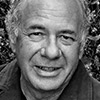-
Spring Feature 2017
-
Feature
-
POETRY
- Susan Berlin
- Laure-Anne Bosselaar
- Elena Karina Byrne
- Billy Collins
- Miles Coon
- Shawn Delgado
- Travis Denton
- Stuart Dischell
- Kim Dower
- Stephen Dunn
- Robert Fanning
- Susan Guma
- Naomi Jaffa
- Kenneth Knoespel
- Gerry LaFemina
- James Langford
- Michael Laskey
- Seth Michelson
- Andrew Motion
- Dean Parkin
- Michael Ryan
- Vivek Sharma
- John Skoyles
- Marc Straus
-
ESSAY
Feature > Poetry
Notes Toward a Remembrance
Thomas Lux was not a young man when he died, but he retained the curiosity, dexterity, and vigor of a young poet.
He was the best friend I will ever have and listened to all the crazy shit I did or said and loved me and never judged me.
He did not invent the concept of friendship but did more to further it than anyone I have known.
He was aptly named Lux for his light and Thomas for his simultaneous faith and doubt.
He was public enemy number one against cant, pretense, and hypocrisy and fiercely opposed bullshit.
His vividness was too bright for sainthood (especially in the faze of his Hawaiian shirts).
To the Left of Time with its double sense of title is one of his best books and his wisest.
The horse Thomas Lux rode on the dairy farm was named Sunday. That's why he gave his third book that title.
Tom's father, Norman, told him when paying in a restaurant to always leave the tip under the saltshaker so the money wouldn't blow away.
He hated when people referred to him as Tom not Thomas in print.
He would have made a great old man.
His example is best honored by kindness, generosity, and devotion to our art.
The Milkman and His Son
For a year he'd collect
the milk bottles—those cracked,
chipped, or with the label's blue
scene of a farm
fading. In winter
they'd load the boxes on a sled
and drag them to the dump
which was lovely then: a white sheet
drawn up, like a joke, over
the face of a sleeper.
As they lob the bottles in
the son begs a trick
and the milkman obliges: tossing
one bottle in a high arc
he shatters it in mid-air
with another. One thousand
astonished splints of glass
falling . . . Again
and again, and damned
if that milkman,
that easy slinger
on the dump's edge (as the drifted
junk tips its hats
of snow) damned if he didn't
hit almost half! Not bad.
Along with gentleness,
and the sane bewilderment
of understanding nothing cruel,
it was a thing he did best.
from Half Promised Land, Mariner Books, Houghton Mifflin Harcourt, 1986
the milk bottles—those cracked,
chipped, or with the label's blue
scene of a farm
fading. In winter
they'd load the boxes on a sled
and drag them to the dump
which was lovely then: a white sheet
drawn up, like a joke, over
the face of a sleeper.
As they lob the bottles in
the son begs a trick
and the milkman obliges: tossing
one bottle in a high arc
he shatters it in mid-air
with another. One thousand
astonished splints of glass
falling . . . Again
and again, and damned
if that milkman,
that easy slinger
on the dump's edge (as the drifted
junk tips its hats
of snow) damned if he didn't
hit almost half! Not bad.
Along with gentleness,
and the sane bewilderment
of understanding nothing cruel,
it was a thing he did best.
from Half Promised Land, Mariner Books, Houghton Mifflin Harcourt, 1986



